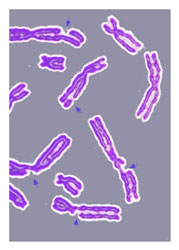To date, scientists have been limited to running a small number of DNA samples at a time at a cost of K100 000 per sample. KTH researchers in Sweden have now come up with a new method which means that 5000 samples can be run simultaneously for the same price.

An image of multiple chromosomes (some are incomplete as they are damaged). (Image: Wikimedia Commons)
This cuts the cost per test result considerably and is believed to be a world record for the number of samples run in a single DNA sequence analysis.
"We had to invent a method to produce many DNA samples simultaneously. Otherwise, the analyses would have taken an incredibly long time and would have cost a huge amount of money," says Peter Savolainen, a biology researcher at KTH.
He and his research colleague Afshin Ahmadian and former graduate student Martin Neiman, comprised the team that invented the new method - one that now allows DNA sequence analyses can be carried out in record time and at an incredibly low cost.

Afshin Ahmadian, researcher at KTH.
"Today around 10 samples are produced simultaneously at a cost of Kr10 000 (about R11 000) per sample. We have run 5000 samples for the same amount, i.e. Kr100 000 (about R111 000). This means an actual cost of Kr20 (about R22) per sample," says Savolainen.
Potential for use in a number of areas
He points out several areas where he and his colleagues' new method can be of great importance. One of these is in cancer research where there is a great need to scan a lot of smear tests from many individuals.

Peter Savolainen, researcher at KTH.
"Another area where our method can be of great significance is in organ transplantation. It requires many DNA analyses to create a database for matching organ donors with the recipient of the graft. This will have important implications for DNA research," says Savolainen.
He adds that even now, before the method is officially accepted, there are several projects at the Science for Life Laboratory (which KTH forms a part) that are in line to use this way of working. Moreover, there is the possibility to scale up the method so that more tests can be run simultaneously.
The method itself is quite clever.

The machine that KTH researchers used to obtain the world record in DNA analysis.
"Simply put, we mark each sample in an ingenious manner with an ID, so that any test results can be classified," says Savolainen.
Afshin Ahmadian and Peter Savolainen are KTH researchers working at the Science for Life Laboratory in Stockholm, Sweden.
Source: KTH - Royal Institute of Technology










































